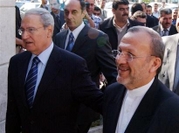 UNITED NATIONS – Syria opposes the U.N. request to question six of its officials in Beirut about the assassination of Lebanon’s former prime minister because their presence could cause friction between the two countries, Syria’s U.N. ambassador said Tuesday. Fayssal Mekdad, the ambassador, said Syria has offered chief investigator Detlev Mehlis the chance to interview the Syrians at offices in Cairo, the Golan Height, Vienna or Geneva."We hope that Mr. Mehlis does not rule out all these possibilities, because at the end of it what’s requested is the substance
UNITED NATIONS – Syria opposes the U.N. request to question six of its officials in Beirut about the assassination of Lebanon’s former prime minister because their presence could cause friction between the two countries, Syria’s U.N. ambassador said Tuesday. Fayssal Mekdad, the ambassador, said Syria has offered chief investigator Detlev Mehlis the chance to interview the Syrians at offices in Cairo, the Golan Height, Vienna or Geneva."We hope that Mr. Mehlis does not rule out all these possibilities, because at the end of it what’s requested is the substance
Mekdad said Mehlis requested interviews with the Syrian officials — whom he did not identify — at the U.N. commission’s headquarters at the hilltop Monteverde Hotel east of Beirut.
"Our view is that bringing back our people to Lebanon is really sensitive, sensitive for our own people and for the Lebanese," Mekdad said.
Mekdad reiterated Syria’s "readiness to cooperate" with the investigation of Hariri’s assassination in a bombing in Beirut that killed 20 others.
When asked whether Syria was totally ruling out any interviews in Lebanon, Mekdad did not answer directly, instead reiterating that Damascus does not want to further complicate its relations with Lebanon.
The U.N. Security Council unanimously adopted a resolution on Oct. 31 warning Syria of possible "further action" if it refuses to cooperate with the U.N. investigation.
Mehlis’ probe has been extended until Dec. 15 and the United States, France and Britain, which co-sponsored the resolution, pledged to pursue tough measures if Syria fails to comply.
The probe on Tuesday came under criticism from Mohammed Raad, the head of Hezbollah’s 11-member bloc in the Lebanese parliament, who accusing U.N. investigators of exposing Lebanon’s security secrets to Israel‘s Mossad intelligence agency.
"All files of internal security, communications and intelligence have been opened under the pretext of investigation," Raad said in an interview with the TV channel New Television. He said the files "have now come into the hands of the Mossad."
Raad presented no evidence to support his claim and could not be reached by The Associated Press for further comment.
Hezbollah has in the past accused Israel of seeking to intervene in Lebanon’s internal affairs and has said an Israeli role in Hariri’s assassination should not be ruled out.
The U.N. resolution prompted by the investigation requires Syria to detain anyone considered a suspect and let investigators determine the location and conditions under which the individual would be questioned.
It also would freeze assets and impose a travel ban on anyone identified as a suspect by the commission, though council members say this provision will not be implemented until after Mehlis’ final report in December.
After the resolution was adopted, Syria announced that it was setting up its own investigation into the Hariri assassination.



